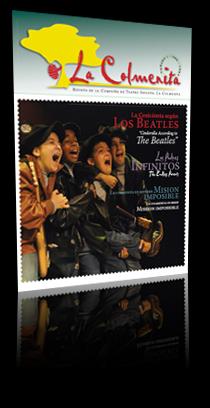Thr parents ENDELESS
When you have a child,” the poet once wrote, “you have so many children”… And you get to understand this loving feeling when you drop by La Colmenita’s parents. Jawing it up with them you surely know how big the beehive really is.
And you learn from Belkis’ grandma, who is a doctor, when it comes to telling humans and beasts apart; and cozy up to Carmen, another grandma who used to commute on a crowded bus 27 but who’s already wired up to the dads who can take her in their cars. Workers, teachers, engineers, housewives, musicians. Th ere’s always someone who picks up the kids when the designated driver can’t, kids who learn to behave like siblings while they act and play.
Prof. Alberto Fernandez recalls his son’s tenure in the company. “I’m one of the original dads, from the times when there was nothing here and we used to ride both the kids and the costumes on bicycles to the shows. I remember there were grandmas who gave the last years of their lifetimes for the sake of the initial projects. The best and most visible result was and still is the love our children are brought up with.”
He says his son Marcel, after 11 years in this “little glass box,” ended up ready to live his life. “He’s 20 now and is enduring the military draft, yet his character and stamina to cope with all the tasks were whipped into shape right here.” Somebody tells me. “Hey, reporter, go ask that married couple over there. Th ey’re part of La Colmena.” Braulio and Maite get back to me with broad smiles on their faces.
“Our two daughters are little bees,” she says and looks up at her husband. “Claudia jumped on the bandwagon in 2001, and Katehrin, well, go fi gure. She’s been around since she was born.” How do you manage to juggle this double-bee situation? “We’re very close,” Braulio replies, “and we share all the chores back home. Anyway, it’s not that easy sometimes.
We live in San Miguel del Padron and the runaround is really something. We got to take them to school, and from the school to down here, and from here to our house, with rehearsals, costumes and tours in between. But it’s worth it because in here they learn things that can’t be taught anywhere else.
On the other side of the balcony stands Carolina, a psychologist and a repeater. “Th at’s right, because when my little son Mario Andres saw his sister Ana Laura –she’s been in the company for eight years- we couldn’t help but let him climb onstage. Th e bottom line is this is a great place for children to grow up, feel good and have fun. Th ey own this space, they learn to give their very best and be responsible with a project and toward their classmates.
“I remember that when the fi rst shows with impaired kids were staged, I was pregnant. It did me good to see children with diff erent possibilities and skills coexisting harmonically under the same roof. Th at’s what happens when Danian shows up pushing his wheelchair and everybody rushes to pitch him a hand, thus making all borderlines and limits vanish. Th at’s a good teaching and a good way to shape their character. Th ey’re taught to fi ght, communicate with one another.”
Somebody from the crowd recounts how much fun these kids have when they climb the Turquino Peak or go to explore the mountains of Pinar del Rio and their bus breaks down. “Th ey grow up playing,” Carolina goes on to say. “You walk in La Colmenita, but you can’t leave.”
“It’s like a palace of values,” explains Hermis, Marla Estefania’s mother. “You can’t go along with the kids everywhere they go, but you know they’re going to be alright and well taken care of. My daughter’s been around here since the age of 3 and all parents take care of the entire beehive.”
“And what about the working habits they acquire?” asks Daisy, Rocio’s grandmother. “Because this beehive thing is not only a matter of name. Everybody around here knows what to do and they’re committed to getting the job done. Th e older kids help the smaller ones. Sometimes one of them rips off his socks minutes before going onstage, but the child next to him takes off his socks and gives them to his friend. Th ey get to behave like that spontaneously, as a team.”
“See, reporter?” asks Maristania, a brunette mother who had remained speechless. “Th at’s what I want for my son: a world of fantasy, a true family. I’ve been bound to bring him up on my own and I know they can help him here. Th at’s why I cherish this place and these people so much. I know Jose Antonio is going to have everything I haven’t been able to…,” but her voice trails off as tears fi ll up her big eyes.
She’s speechless once again. “Look,” Carmen, Emily’s grandma, butts in for some help. “I’m 70 and I feel life is worth living when I come to this place. And that Tim guy… his words are sacred to me. Th at explains why these kids are so disciplined.
When you mention the word Colmenita, they know all along it’s something big we’re talking about.” Hazel wraps things up. “Th at’s right, indeed. Th at was the very fi rst word my one-year-old toddler learned. Th e only thing I regret is that I would have liked to be in a company like this during my childhood. All of us would have been little bees.”


